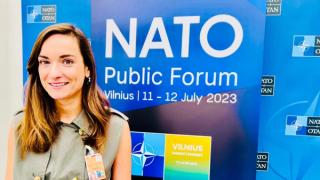From 11-12 July world leaders from NATO countries and their strategic partners joined the annual NATO Summit in Vilnius, Lithuania. Russia’s war with Ukraine remained a key focus with Ukraine’s NATO bid one of the main challenges to resolve. Expanding the alliance to include Sweden and tensions with China were also part of the discussion and joint communiqué.
US President Joe Biden, British Prime Minister Rishi Sunak, Turkish President Tayyip Erdogan and Ukrainian President Volodymyr Zelensky all addressed the summit. USSC Senior Lecturer Dr Gorana Grgic was invited to attend the summit and shares her perspective of what it was like to be in the room for these significant discussions.
Russia’s ongoing invasion of Ukraine was front and centre of the discussions at this year’s NATO Summit in Vilnius. What was announced regarding timelines and conditions for Ukraine to join NATO?
The NATO summit brought few surprises beyond the initial announcements. Turkey's unexpected change of position regarding Sweden's bid to join the alliance was a welcomed development, removing the remaining barriers for Sweden to become NATO's 32nd member state.
As expected, the summit's final communiqué did not provide a clear timetable for Ukraine's accession to NATO, as anticipated. Instead, the consensus was to extend an invitation to Ukraine to join when certain conditions are met, leaving the Ukrainian Government and its supporters dissatisfied.
President Zelenskyy strongly expressed his disappointment, describing the decision as absurd and a weak signal of NATO's commitment to Ukrainian security. Despite pledges of aid from individual countries and blocs like the G7, he and his government had hoped for stronger support.
Concerns about expediting Ukraine's membership were raised by a number of allies, including the United States. They cited two primary reasons for their cautious approach. First, incorporating a country in conflict could potentially draw the entire alliance into a war with Russia. Second, NATO membership entails obligations beyond military capabilities, and some believe Ukraine still needs significant political reforms to consolidate its democracy.
The stories shared by Ukrainian officials and civil society representatives in Vilnius make it hard to remain indifferent to their desperate pleas for security and peace. Nevertheless, compared to previous summits, it is clear that NATO now sees Ukrainian membership as a matter of "when" rather than "if," signalling a major shift in perspective.
Much of the joint communiqué was focused on Russia’s war on Ukraine. What security commitments did NATO make to Ukraine at the Summit and what actions will they take to deter Russia?
NATO's security commitments to Ukraine encompass various aspects. Firstly, individual allies have made pledges regarding military and other forms of aid to support Ukraine.
At the alliance level, NATO allies have decided to establish the NATO-Ukraine Council, providing Ukraine with an equal platform for discussions on Euro-Atlantic security. This council will facilitate joint consultations, decision-making, and activities, as well as serve as a crisis consultation mechanism between NATO and Ukraine.
Furthermore, there is a commitment to transform the Comprehensive Assistance Package (CAP), which focuses on non-lethal aid, into a multi-year program. This program aims to rebuild Ukraine's security and defence sector and transition the country towards full interoperability with NATO.
Lastly, the allies have all committed to allocating at least two per cent of GDP annually to defence, including meeting long-standing major equipment requirements and NATO Capability Targets. These resources will support NATO's new defence plans and force model, as well as contribute to NATO operations, missions, and activities, all with the intention of deterring Russia.
NATO is increasingly adopting a global focus and Australian Prime Minister Anthony Albanese has been invited to the last two NATO Summits. Where is NATO hoping to go with Australia and would it ever expand beyond the North Atlantic?
The deepening relations between NATO and its Indo-Pacific partners can be seen from two perspectives. Firstly, they contribute to the expanding network of diplomatic and security cooperation initiatives aimed at bridging the Euro-Atlantic and Indo-Pacific regions.
From another standpoint, these partnerships reflect the evolution of NATO's partnerships over the past few decades. Initially, NATO's cooperation with Australia, Japan, the Republic of Korea, and New Zealand involved resource pooling to provide security for non-NATO members, as seen in the Balkans and Afghanistan. However, strengthening these partnerships is now considered crucial for enhancing defence capabilities both within the alliance and among its partner nations.
Australia has already been a part of an exclusive group called the "Enhanced Opportunities Partners" that receive enhanced access to interoperability initiatives and increased opportunities for dialogue and consultation with NATO allies. Australia engages with NATO in various areas, including membership in the Cooperative Cyber Defence Centre of Excellence, participation in the Unmanned Systems Initiative, collaboration on introducing unmanned systems to national navies, and regular involvement in NATO exercises open to partners. Additionally, Australia has contributed to the NATO Ukraine CAP Trust Fund. At their meeting in Vilnius, Prime Minister Anthony Albanese and NATO Secretary General Jens Stoltenberg agreed to further intensify collaboration in cybersecurity, emerging technologies, and countering hybrid threats.
While we are seeing the partnerships between NATO and Indo-Pacific partners pick up pace and deepen, it's important to emphasise that this does not imply the presence of NATO assets in the Indo-Pacific, nor does it suggest that Australia, Japan, Korea, or New Zealand will through their support of Ukraine become a permanent feature of the European security architecture. However, in the current era of competitive and adversarial multipolarity, effective coordination among a broader group of countries is essential and in the interest of all parties involved.






